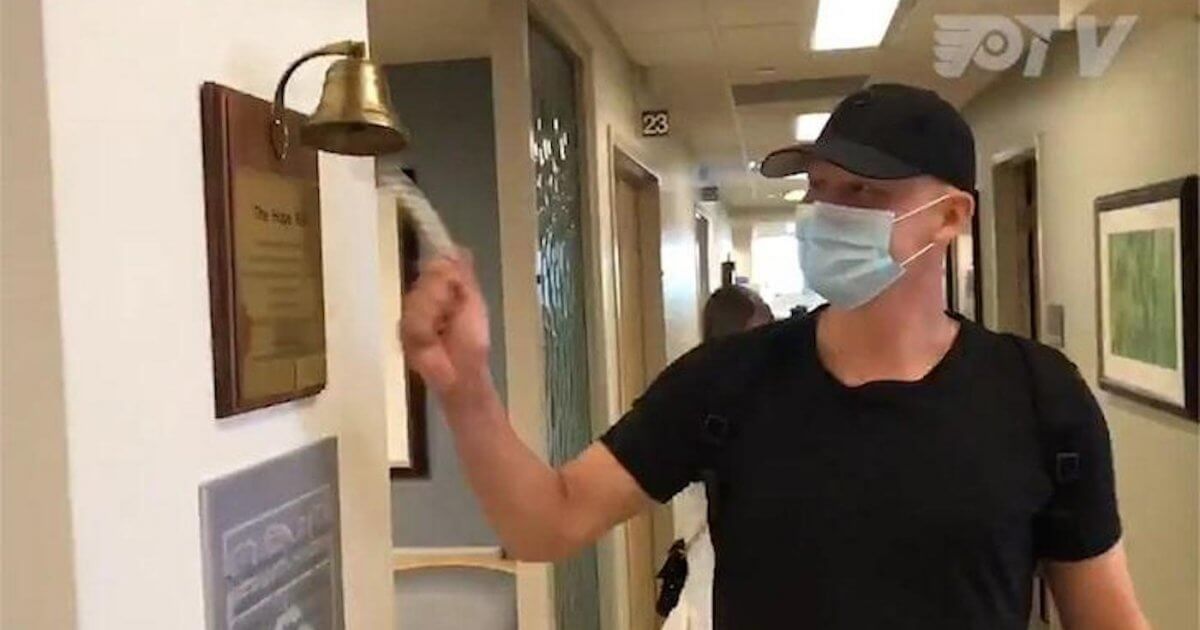Fight; Inspire; Overcome; Celebrate â those are just a few words professional ice hockey team, the Philadelphia Flyers, used to describe Oskar Lindblom’s battle with cancer, and the joy they felt upon him completing treatment.
On Twitter, the Philly Flyers shared a video of player Lindblom, 23, ringing the bell at Abramson Cancer Center at the Hospital of the University of Pennsylvania, signaling the completion of his radiation treatment. Lindblom was diagnosed with Ewing’s Sarcoma last December, and has been undergoing rounds of chemotherapy and radiation while battling the disease.
Read MoreFight. Inspire. Overcome. Celebrate.
Ring that bell, @oskarlindblom!@PennMedicine #OskarStrong pic.twitter.com/RM1PCxHnfY— Philadelphia Flyers (@NHLFlyers) July 2, 2020
What Is Ewing’s Sarcoma?
Ewing’s Sarcoma is a cancer that grows in the bone or soft tissue, which can spread to other parts of the body. It’s often found in young adults from teen years to mid-20’s. Symptoms of Ewing’s Sarcoma include pain and swelling in parts of the body such as arms, legs, pelvis, chest, or back; a noticeable lump in same parts of the body; fever; and severe bone fragility which may cause the bones to break.
According to the American Cancer Society, more than 16,000 new cases of Ewing’s Sarcoma are diagnosed each year. If caught early enough, the 5-year survival rate of the disease is 83%.
Life After Cancer Treatment: Survivors’ Stories
Thanks to incredible developments in research, a cancer diagnosis doesn’t immediately symbolize a death sentence. That’s a piece of life advice breast cancer survivor Vera Trifunovich shared with SurvivorNet. It’s understandably difficult for people not to jump to the worst case scenario when hearing a cancer diagnosis, and like Vera, many people have preconceived notions of what cancer is, and the impact it has one the patient and their family. However, once hearing her own diagnosis, she learned more about the disease, and changed her mindset which helped her treatment tremendously.
“When I was 27 years old, I lost my mother to a very aggressive breast cancer that took her in less than a year,” Trifunovich says. “As a result of that, I developed a kind of a strange attitude about my health…I remember I got my diagnosis [and] I was just so filled with this horrific feeling of, oh my god, history is repeating itself…It’s not easy. It’s not great news, but it’s not necessarily a death sentence. That, for me, was the flip side. I’d had that horrible experience of losing my mother, I conceptualized cancer, specifically breast cancer in my case, as a death sentence, which is it’s not necessarily. Not at all. There’s so much hope, and more and more hope all the time.”
Breast cancer survivor Vera Trifunovich learned that cancer isn’t a death sentence
For some people, completing cancer treatment can make you appreciate life and what you want to do for the future. Jovannie Lorenzo was only 32 years old and a single mother to three children when she was diagnosed with colon cancer. Instead of focusing on the negatives, she saw her cancer diagnosis as a chance at a second life and as a way to be reborn.
Related: American Life Expectancy Goes Up Decline In Cancer Deaths A Major Factor
“We just believe in salvation of yourself, of your heart, and that when you give your heart to God, it belongs to him, and that you belong to him,” Lorenzo says. “I do believe in being born again. I feel that after having had my cancer, for me this was my second chance at life. This was my rebirth, so to say. This was my opportunity to try and get this life done right.”
Colon cancer survivor Jovannie Lorenzo says she saw her cancer diagnosis as a second chance
Learn more about SurvivorNet's rigorous medical review process.


